The Year of Reading Proust discussion

This topic is about
Time Regained
Time Regained, vol. 7
>
Through Sunday, 1 Dec.: Time Regained
 We get the first positive comment on Morel... now that he has fallen for a woman he is of a "fidélité absolute" and he would not sell himself ever for even 50k FFR, while he had sold himself before for 50 FFR-- to the Prince de Guermantes.
We get the first positive comment on Morel... now that he has fallen for a woman he is of a "fidélité absolute" and he would not sell himself ever for even 50k FFR, while he had sold himself before for 50 FFR-- to the Prince de Guermantes.
 Another horizontal thread and Botany.
Another horizontal thread and Botany.The beginning of Sodome & Gomorrhe had a wonderful introduction on homosexuality following a botanical argument. The Narrator picks up this thread again...
Ainsi en est-il chez les fleurs où une même sagesse, mise en évidence par Darwin règle les modes de fécondation en les opposant successivement les uns aux autres. p. 164.
 Jocelyne wrote: "Fionnuala wrote: "Kalliope wrote: "The intro to AD says that the "brouillon" for Le Temps Retrouvé was written in 1911 (Cahier 57). My understanding is that the basic Cycle and structure was compos..."
Jocelyne wrote: "Fionnuala wrote: "Kalliope wrote: "The intro to AD says that the "brouillon" for Le Temps Retrouvé was written in 1911 (Cahier 57). My understanding is that the basic Cycle and structure was compos..."GF makes the comment that Proust is getting confused with his Norpois and his Brichot... so, may be a computer, or a better health would have been good for him.
Anyway, the section on Norpois and his syntax and the use of the verb "savor" or "to know", as well as the future tense, is wonderful...
Charlus tells the Narrator:
Avez vous remarqué que l'excellent homme tenant à proclamer ses désirs contre une vérité sur le point d'être réalisée, n'ose pas tout de même employer le futur pur et simple, qui risquerait d'être contredit par les événements, mais a adopté comme signe de ce temps le verb "savoir"? pp. 165-166.
And after a typical digression, he comes back to this theme and gives several examples of the way Nations (who are like individuals, since they are composed by them) also "know" or would not know --- "ne saurait"...
 Patricia wrote: "this beauty is just TOO-MUCH
Patricia wrote: "this beauty is just TOO-MUCHthe real Tasonville
http://www.galorbe.com/Categorie/Des-..."
Tasonville?
 Fionnuala wrote: "Elizabeth wrote: ".The passage about Germans is weird, I'll admit. They were "too close" to him in--I guess appearance and blood--to appeal to him sexually, though he admired them for other reasons...
Fionnuala wrote: "Elizabeth wrote: ".The passage about Germans is weird, I'll admit. They were "too close" to him in--I guess appearance and blood--to appeal to him sexually, though he admired them for other reasons..."...Charlus is bemoaning the loss of the statues at the Reims cathedral which have been destroyed"

"German shell at moment of impact on Reims Cathedral. When the French showed Wilson the destruction in 1919, Wilson said of the damage to Reims and its Cathedral (to justified French outrage),'it really isn't so bad....'"
http://www.public.iastate.edu/~kjg/ww...
 Marcelita wrote: ".Bombing of Reims Cathedral. "
Marcelita wrote: ".Bombing of Reims Cathedral. "Wow! That someone caught that moment on film is amazing. I have visited Reims cathedral and they must have renovated it very well because I didn't realise it had been bombed.
 Fionnuala wrote: "Jocelyne wrote: "Yes, interesting question. By the way, did I dream it, or did someone say that Proust wrote Le Temps retrouvé soon after Swann's way?"
Fionnuala wrote: "Jocelyne wrote: "Yes, interesting question. By the way, did I dream it, or did someone say that Proust wrote Le Temps retrouvé soon after Swann's way?"Yes, I thought I had understood that too - b..."
Fionnuala wrote: "Jocelyne wrote: "Yes, interesting question. By the way, did I dream it, or did someone say that Proust wrote Le Temps retrouvé soon after Swann's way?"
Yes, I thought I had understood that too -.."
Two volumes...then the war.
"Similar efforts to safeguard the structure and format of his book emerge in this same letter during Proust's discussion with Grasset about the title of his novel. At this point, the author has given his work the provisional title Lost Time (1st part) and Lost Time (2nd part) [Le Temps Perdu (1ère partie) et l'autre Le Temps Perdu (2e partie)], which he justifies 'because in truth it is a single work' ("[p]uisque en réalité c'est un seul ouvrage")."
From his letters at Brandeis University:
http://brandeisspecialcollections.blo...
 Fionnuala wrote: "Marcelita wrote: ".Yes, Kalliope, you are spot-on.
Fionnuala wrote: "Marcelita wrote: ".Yes, Kalliope, you are spot-on. From Carter's biography, which is always by my side:."
Earlier today, Marcelita, there was mention made of a tribute film made about Celeste cal..."
A TRIBUTE TO KALLIOPE: i cannot but agree wholeheartedly
 Proust foreshadowing...drones?
Proust foreshadowing...drones?"The best army will be, perhaps, the army with the best eyes." (p 82)
And by not heeding this advice, the seeds were planted for another war:
"We know that victory will be ours and we are determined that it shall be, so that we can dictate a just peace, I don't mean 'just' simply for ourselves, but truly just, just to the French and just to the Germans."
 Patricia wrote: "this beauty is just TOO-MUCH
Patricia wrote: "this beauty is just TOO-MUCHthe real Tasonville
http://www.galorbe.com/Categorie/Des-..."
Thank you for sharing this Patricia! I'll go tweet this at #Proust2013.
 Much happens and is thought on the walk (ML p.107-172) that the Narrator takes with M de Charlus across night-time Paris. There have been long tram rides, long salons but this is the longest walk in pages read.
Much happens and is thought on the walk (ML p.107-172) that the Narrator takes with M de Charlus across night-time Paris. There have been long tram rides, long salons but this is the longest walk in pages read.
 Fionnuala wrote: "Another Lazarus - Mme Molé, this time...
Fionnuala wrote: "Another Lazarus - Mme Molé, this time...Brichot's cover for his personal opinions, so cleverly lampooned here by the Narrator: À partir de ce moment Brichot remplaça 'je' par 'on', mais 'on' n'em..."
I like the expression, the Lazaruses... in La recherché.. We could try and make the list (similarly as with the Dreyfusards and Antidreyfusards)...
 Book Portrait wrote: "Air raids on Paris during WWI:
Book Portrait wrote: "Air raids on Paris during WWI:http://geographicalimaginations.com/t..."
Fascinating photos, BP.
The sky in the first one certainly recalls the Van Gogh posted by FioFio in comment #9.
 The importance that Proust is giving to the newspapers during the war time is very interesting. We see several of the characters (Brichot or Chochotte and Morel, for example) engaged in journalism, and the way it acquires so much power as that is the way the Body (country) can control and keep the cohesion of its cells (individuals).
The importance that Proust is giving to the newspapers during the war time is very interesting. We see several of the characters (Brichot or Chochotte and Morel, for example) engaged in journalism, and the way it acquires so much power as that is the way the Body (country) can control and keep the cohesion of its cells (individuals).The newspapers as part of the process of democratization of societies. Charlus finds that now everyone has an opinion on the Emperors and Kings in Europe, thanks to the newspapers, while his opinion is based on knowing them personally.
There is a wonderful series of books (five volumes) dealing with the social culture of France from mid 19th to mid 20th and one of the volumes has a chapter on Newspapers and Corruption.
I have only read two of these, long ago.. May be it is time for a revisit.
The chapter on newspapers is in this volume:
A History of French Passions: Volume 4 - Taste and Corruption
For anyone interested in this period in France, this series is a wonderful read.
 An interesting section on narrative techniques.
An interesting section on narrative techniques.Criticizing Brichot, the latter reacts by citing Anatole France who had said that the use of the "I" or "Je/Moi" is hateful (haïssable).. which led Brichot to write impersonal sentence structures which begin with the "On.."
So, Proust resorted to a fictional and displaced "Je/Moi", which was not Je, nor was it On, nor was it He or "Il"...
 Marcelita wrote: "Fionnuala wrote: "Elizabeth wrote: ".The passage about Germans is weird, I'll admit. They were "too close" to him in--I guess appearance and blood--to appeal to him sexually, though he admired them..."
Marcelita wrote: "Fionnuala wrote: "Elizabeth wrote: ".The passage about Germans is weird, I'll admit. They were "too close" to him in--I guess appearance and blood--to appeal to him sexually, though he admired them..."What an incredible photograph, Marcelita.
The footnotes in the GF say that this cathedral, before the bombing had also suffered a fire in September 1914.
 The metamorphoses taking place in this novel....
The metamorphoses taking place in this novel....Our dear Mme Verdurin has now become the luminary in the very Faubourg Saint-Germain, the social circle she abhorred at the beginning.
Le faubourg Saint-Germain, chapitré par Mme Verdurin.... p. 178.
 And one more horizontal thread:
And one more horizontal thread:The attractive "valets de pied" that we saw in the Soirée Musicale of the Mme de Saint-Euverte, in Un amour de Swann.
With the war Charlus regrets the disappearance of these male beauties..
Pensez que tous ces valets de pied qui avaient deux mètres de haut et qui ornaient les escaliers monumentaux de nos plus belles amies, ont tous été tués.. p. 179.
In Un amour de Swann, these male figues had been associated to those in Italian paintings... That was a magnificent scene.... Some quotes - it is a longer section...
L'un d'eux, d'aspect particulièrement féroce et assez semblable à l'exécuteur dans certains tableaux de la Renaissance qui figurent des supplices, s'avança vers lui d'un air implacable pour lui prendre ses affaires.
...dans la fête où on allait l'introduire, pour la première fois il remarqua, réveillée par l'arrivée inopinée d'un invité aussi tardif, la meute éparse, magnifique et désœuvrée de grands valets de pied qui dormaient çà et là sur des banquettes et des coffres et qui, soulevant leurs nobles profils aigus de lévriers, se dressèrent et, rassemblés, formèrent le cercle autour de lui.
That kind of magnificence makes me think of Veronese's Feast in the House of Levi, which I could admire recently.
The banquet, the staircase,...

 Kalliope wrote: "Charlus finds that now everyone has an opinion on the Emperors and Kings in Europe, thanks to the newspapers, while his opinion is based on knowing them personally.."
Kalliope wrote: "Charlus finds that now everyone has an opinion on the Emperors and Kings in Europe, thanks to the newspapers, while his opinion is based on knowing them personally.."Well stated, Kalliope - there was a sense of comedy in the way Proust
gave Charlus a personal relationship with practically every crowned head of Europe.
Interesting too the way Charlus describes the chess-like moves of those same crowned heads - the unwillingness to make a move before the outcome is predictable for fear of aligning themselves with the losing side...
 Fionnuala wrote: "
Fionnuala wrote: "Well stated,..."
Yes, sad comedy.. it made me feel sorry for Charlus too... The world was about to change.. or it was changing already...
...and not very flattering to the crowned heads....
 Book Portrait wrote: "Air raids on Paris during WWI:
Book Portrait wrote: "Air raids on Paris during WWI:http://geographicalimaginations.com/t..."
Collected site and Ooooh'd...superb find!
Remembering the searchlights:
"Aeroplanes were still mounting like rockets to the level of the stars, and searchlights, as they quartered the sky, swept slowly across it what looked like a pale dust of stars, of errant milky ways." MP
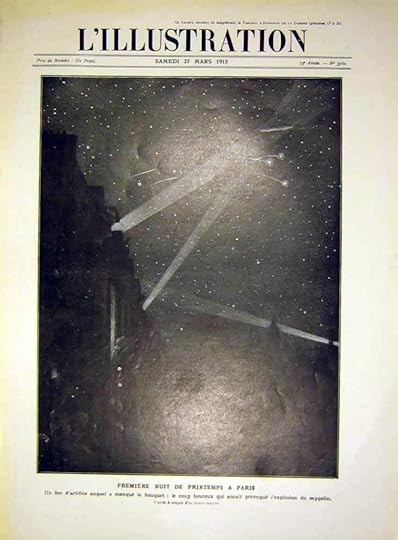
From an eyewitness:
"Searchlights were playing in all directions, but at first nothing was visible except the ghostly outline of the Eiffel Tower. Then I noticed that several stars were obscured by what seemed to be a long grey cloud moving at a tremendous rate..."
http://geographicalimaginations.com/t...
 Book Portrait wrote: "
Book Portrait wrote: "http://geographicalimaginations.com/t..."
I have also saved this link. To return to it when I read more on WWI next year...
 The market of French modernism was indeed developed by the American and German collectors...
The market of French modernism was indeed developed by the American and German collectors...Mais avant la guerre ils (Américains) aimaient notre pays, notre art, ils payaient fort cher nos chefs d'oeuvre. Beaucoup sont chez eux maintenant. p. 180.
Marketing Modernism in Fin-de-Sicle Europe
A large part of the Impressionist collection in the Musée d'Orsay is thanks to Gustave Caillebotte who bequeathed the considerable collection of his friend painters, to the French State, with the proviso that they should be displayed at the Louvre...
Interesting story.. More in the section "Caillebotte's Collection" in wiki..
http://en.wikipedia.org/wiki/Gustave_...
 For FioFio...
For FioFio...Pourquoi la restitution de l'Alsace-Lorraine a-t-elle paru à la France un motif insuffisant pour faire la guerre, un motif suffisant pour la continuer, pour la redéclarer à nouveau chaque année?.p. 181.
 Marcelita wrote: "From an eyewitness:
Marcelita wrote: "From an eyewitness:"Searchlights were playing in all directions, but at first nothing was visible except the ghostly outline of the Eiffel Tower. Then I noticed that several stars were obscured by what seemed to be a long grey cloud moving at a tremendous rate"...."
Speaking of clouds moving at a tremendous rate, I can't resist posting (and yes, it's a bit gimmicky) a link I found while searching for an image address for Van Gogh's Starry Night earlier in the week:
http://imgur.com/gallery/VIeMk
 Marcelita wrote: "Proust foreshadowing...drones?
Marcelita wrote: "Proust foreshadowing...drones?"We know that victor..."
Marcelita, may be not foreshadowing, but certainly showing a great deal of wisdom. His misgivings, expressed through Charlus' speech, read for us differently from the way they would have when this volume was published.
Or rien ne dit qu'une guerre aussi prolongée même si elle doit avoir une issue victorieuse ne soit pas sans péril.
and
Pourtant que ne peut-on craindre d'un surmenage pareil à celui d'une guerre ininterrompue pendant plusieurs années.
And then makes a spooky comment using a character from a book by Maurras (Aimée de Coigny), who, the footnote clarifies, took advantage of the war to betray the regime that had engaged in it during Napoleonic times...
Charlus wonders whether this WWI will not produce also such a character....
 Charlus mentions a group of statues from Strasbourg Cathedral - which I have also visited - in this section. I feel he must be referring to this pair although the notes don't pick up on the remark except to mention Maurice Barrès briefly.:
Charlus mentions a group of statues from Strasbourg Cathedral - which I have also visited - in this section. I feel he must be referring to this pair although the notes don't pick up on the remark except to mention Maurice Barrès briefly.: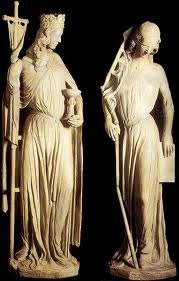
The two statues can be seen one each side of the south door of the cathedral facing the square where an outdoor court held its sessions in medieval times - there is also a statue of King Solomon above that door.
They are both very beautifully carved for the time - 1300s - and they symbolise the tenet of the medieval church that the chosen people were no longer the Jewish race but the followers of the church founded by the disciples of Jesus. The statue on the left represents The Church Triumphant and the other one, the more beautiful one, represents The Synagogue, humiliated, blindfolded, her lance broken in several places.
The reason why I think he might be referring to this particular pair is that they are mentioned in the same sentence as M Barrès, and M. Déroulède, both anti-drefusards and fervent nationalists and therefore likely to share in the triumphalist message of these sculptures.
The more beautiful one - The Synagogue- was sculpted by a woman - very rare for the medieval period but she was the daughter of the Maître d'oeuvre or architect - the profession of architect didn't exist at the time.
There is another group of statues on the front of the cathedral, surrounding the west door - the wise and foolish virgins along with the tempter - who has a serpent concealed behind his back - this one reminds me of Charlus - especially since he speaks in the letter to the Narrator about his own personal serpent who motivateds some of his actions:
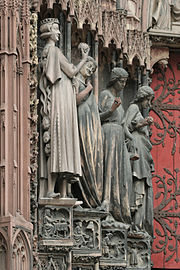
I have a better photo of him somewhere - one which shows his wily smile better - and will post it if I find it.
These statues are almost contemporaneous with the ones destroyed in Reims - and Reims was where the first smiling church statue of this period was to be found - didn't the Narrator refer to this statue in an earlier volume? It was of an angel - another image to hunt for....
Here's The Tempter again - but the serpent isn't visible unfortunately :(

And finally, the smiling angel from Reims Cathedral - pleased he wasn't destroyed in the bombing:
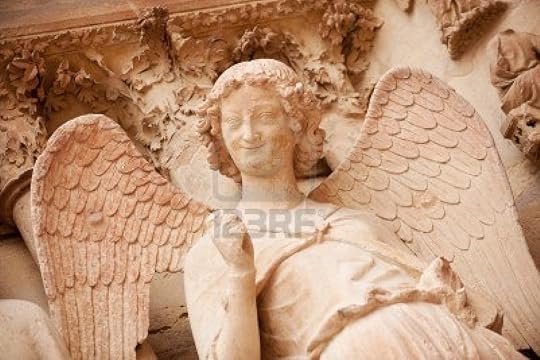
 Fionnuala wrote: "Charlus mentions a group of statues from Strasbourg Cathedral in this section. I feel he must be referring to this pair although the notes don't pick up on the remark except to mention Maurice Barr..."
Fionnuala wrote: "Charlus mentions a group of statues from Strasbourg Cathedral in this section. I feel he must be referring to this pair although the notes don't pick up on the remark except to mention Maurice Barr..."Those statues are wonderful.....
 Fionnuala wrote: "Marcelita wrote: "From an eyewitness:
Fionnuala wrote: "Marcelita wrote: "From an eyewitness:"Searchlights were playing in all directions, but at first nothing was visible except the ghostly outline of the Eiffel Tower. Then I noticed that several star..."
Perfect.. I am planning a visit to Amsterdam next year... to visit, amongst other things the Van Gogh museum after which was renovated last year.
 We are obviously picking many horizontal threads in the last volume.
We are obviously picking many horizontal threads in the last volume.The "projeteurs" wonderfully illustrated above by BP and quoted by Marcelita, hold an echo for the Narrator and remind him of the evening spent in Saint-Loup's room in Doncières, producing the same emotional reaction..., but with a new sorrowful tone.
..inspirait cette même sorte de reconnaissance et de calme que j'avais éprouvés dans la chambre de Saint-Loup, dans la cellule de ce cloître militaire où s'exerçaient, avant qu'ils consommassent, un jour, sans une hésitation, en pleine jeunesse, leur sacrifice, tant de coeurs fervents et disciplinés. p. 187.
 During this very long night when the Narrator and Charlus ignore the curfew and discuss so many military and political topics, it's interesting to see that the sections which Proust added later, according to the notes, all seem to concern the more serious aspects of these subjects while the sections which were written earlier focus more on Charlus' more frivolous comments - about the numerous military men who were out and about on the streets that night or the fine figures of the English soldiers to be seen in Rouen. And again he references cathedral statues - this time the cathedral at Rouen and its saints émaciés
During this very long night when the Narrator and Charlus ignore the curfew and discuss so many military and political topics, it's interesting to see that the sections which Proust added later, according to the notes, all seem to concern the more serious aspects of these subjects while the sections which were written earlier focus more on Charlus' more frivolous comments - about the numerous military men who were out and about on the streets that night or the fine figures of the English soldiers to be seen in Rouen. And again he references cathedral statues - this time the cathedral at Rouen and its saints émaciésSaint André:

 Fionnuala wrote: "Charlus mentions a group of statues from Strasbourg Cathedral - which I have also visited - in this section. I feel he must be referring to this pair although the notes don't pick up on the remark ..."
Fionnuala wrote: "Charlus mentions a group of statues from Strasbourg Cathedral - which I have also visited - in this section. I feel he must be referring to this pair although the notes don't pick up on the remark ..."These are wonderful statues... One day I should visit them...
Thank you FioFio.
 I have received today the Lettres à sa voisine, and have just finished reading the Avant-Propos written by J-Y Tadié.
I have received today the Lettres à sa voisine, and have just finished reading the Avant-Propos written by J-Y Tadié.He finishes the introduction with the following:
Tel qu'il est, ce dialogue dont nous n'entendons qu'une voix et reconstituons l'autre par son reflet, par son écho, a la beauté des statues mutilées que Proust, qui en devait la photographie à sa voisine, a évoquée à propos de la cathédrale de Reims.
According to Tadié, it was Proust's neighbour who gave him a photo with the mutilated statues of the Reims cathedral.
 I'm just looking through letter n°16, dated Noël 1914, where he talks of Reims and the destruction!
I'm just looking through letter n°16, dated Noël 1914, where he talks of Reims and the destruction!Et les pierres elles-mêmes crieront pour demander justice
 Ah - in the same letter, he mentions the smiling angel from Reims and suggests that it announces the Mona Lisa!
Ah - in the same letter, he mentions the smiling angel from Reims and suggests that it announces the Mona Lisa!Mais celle de Reims dont le sourire semplait annociateur de celui de Vinci
 Such images!
Such images! But he also says that war is war and we can't cry about these stone figures - at least that's what I think he means
La guerre est la guerre et nous ne pleurons pas qu'une humanité de pierres
Letter n° 16, Lettres à sa voisine
- and it fits with the Narrator's views in this week's section. he says to Charlus: Ne sacrifiez pas des hommes à des pierres dont la beauté vient justement d'avoir un moment fixé des vérités humaines
 And here is the Saint Firmin from Amiens...
And here is the Saint Firmin from Amiens...Le bras levé de saint Firmin dans un geste de commandement presque militaire disait: Que nous soyons brisés, si l'honneur l'exige...p. 181.
this sentence is immediately followed by the one quoted by FioFio above..
There is a Saint Firmin gate in the Amiens cathedral and the saint is in the "trumeau" or middle pier.
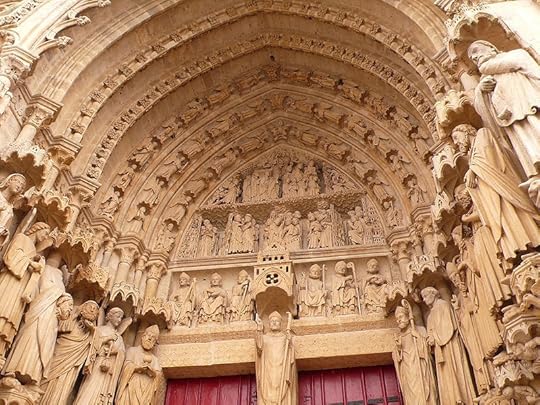
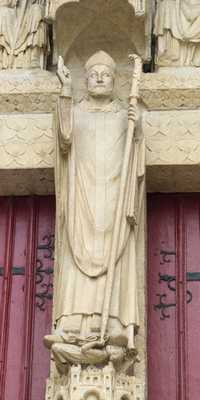
 Sorry I left you only one cathedral and one saint to post, Kall - I was a little over-inspired by this week's reading...
Sorry I left you only one cathedral and one saint to post, Kall - I was a little over-inspired by this week's reading...
 Saint Firmin is an interesting saint to explore. It is for him that people run with the bulls. So the militaristic and virile associations seem to be appropriate ...!!!
Saint Firmin is an interesting saint to explore. It is for him that people run with the bulls. So the militaristic and virile associations seem to be appropriate ...!!!
 Eugene wrote: "Much happens and is thought on the walk (ML p.107-172) that the Narrator takes with M de Charlus across night-time Paris. There have been long tram rides, long salons but this is the longest walk i..."
Eugene wrote: "Much happens and is thought on the walk (ML p.107-172) that the Narrator takes with M de Charlus across night-time Paris. There have been long tram rides, long salons but this is the longest walk i..."True. A heck of a stroll.
 Kalliope wrote: "Book Portrait wrote: "Air raids on Paris during WWI:
Kalliope wrote: "Book Portrait wrote: "Air raids on Paris during WWI:http://geographicalimaginations.com/t..."
Fascinating photos, BP.
The sky in the first one certainly recalls the Van Gogh poste..."
Indeed. And in this respect, Proust has quite a unique view on the war. I am thinking about the colors in the sky, an emphasis on the normality of people eating in restaurants (with soldiers looking at the diners through the windows as did passers-by in Balbec, though with a slight touch of pathos), the lack of fear in the narrator. I have not read Dorgelès's Les Croix de Bois, which lost the Goncourt to Proust's A l'Ombre … but I would imagine it to be quite different, far more conventional, i.e. focusing on the brutality on the battlefield and the devastation suffered by the population. Here we still seem quite removed from the horror of the war, in spite of the damage done by the bombings.
 Fionnuala wrote: "Marcelita wrote: "From an eyewitness:
Fionnuala wrote: "Marcelita wrote: "From an eyewitness:"Searchlights were playing in all directions, but at first nothing was visible except the ghostly outline of the Eiffel Tower. Then I noticed that several star..."
Glad you did not resist.
 Kalliope wrote: "Saint Firmin is an interesting saint to explore. It is for him that people run with the bulls. So the militaristic and virile associations seem to be appropriate ...!!!"
Kalliope wrote: "Saint Firmin is an interesting saint to explore. It is for him that people run with the bulls. So the militaristic and virile associations seem to be appropriate ...!!!"That is interesting - he sounds a little Spanish...
 Just as the neural connection in my brain was starting to weaken, here is Me Verdurin throwing a 'Chochotte'.
Just as the neural connection in my brain was starting to weaken, here is Me Verdurin throwing a 'Chochotte'.Don't you think that Me Verdurin in one of the most monochromatic characters? All her traits are a variation on a darkly perverse theme. She is mean-spirited, cruel, malicious, scheming and vindictive. She seems to have no redeeming qualities. Her magnanimous gesture vis-à- vis Saniette when he became destitute is so out of character, such an aberration that one has to wonder if Céleste did not make a mistake in pasting her paperoles in.
By contrast, St Loup is rather colorful. The narrator likens him to an exotic bird in the Jardin des Plantes and only a few pages later brings forth his nobility of heart and sincerity, sterling qualities which made me yearn for the dashing Marquis de St Loup of Balbec and Doncières, about whom I was starting to entertain lovely fantasies (before, of course, he thoroughly disgraced himself during that undignified quarrel with Rachel when from the Lord/Zèzette).
But Charlus has to be the most layered and colorful character. With each stroke he becomes more authentic, more vulnerable and ultimately more human. I find him immensely likable.
And yes, Morel too seems to redeem himself somewhat. He also gets a few brownie points for opening up to the Narrator about his real motive for staying clear of Charlus. This too renders him a bit more human.
 Thinking back on Françoise watching the passing "parade" in Swann's Way.
Thinking back on Françoise watching the passing "parade" in Swann's Way.“'Poor boys,' Francoise would exclaim, in tears almost before she had reached the railings, 'poor boys, to be mown down like grass in a meadow. It’s just shocking to think of,' she would add, laying a hand over her heart, where presumably she had felt the shock.
'A fine sight, isn't it, Mme. Françoise, all these young fellows not caring two straws for their lives?' the gardener would ask, just to 'draw' her. And he would not have spoken in vain.
'Not caring for their lives, is it? Why, what in the world should we care for if it’s not our lives, the only gift the Lord never offers us a second time? Alas, dear God! You're right all the same, they don’t care! I can remember them in ’70; in those wretched wars they’ve no fear of death left in them; they’re nothing more nor less than madmen; and then they aren’t worth the the price of a rope to hang them with; they’re not men any more, they're lions.' " MP (Swann's Way)
 Jocelyne wrote: "And in this respect, Proust has quite a unique view on the war. I am thinking about the colors in the sky, an emphasis on the normality of people eating in restaurants (with soldiers looking at the diners through the windows as did passers-by in Balbec, though with a slight touch of pathos), the lack of fear in the narrator..."
Jocelyne wrote: "And in this respect, Proust has quite a unique view on the war. I am thinking about the colors in the sky, an emphasis on the normality of people eating in restaurants (with soldiers looking at the diners through the windows as did passers-by in Balbec, though with a slight touch of pathos), the lack of fear in the narrator..."That echo from Balbec is well spotted, J., And yes, the narrator Is very philosophical about it all, not fearful. His approach is very normal, similar to our own - we never think it will happen to us!
Books mentioned in this topic
1913: Der Sommer des Jahrhunderts (other topics)Lettres à sa voisine (other topics)
Lettres à sa voisine (other topics)
Marketing Modernism in Fin-de-Siècle Europe (other topics)
A History of French Passions: Volume 4 - Taste and Corruption (other topics)
More...



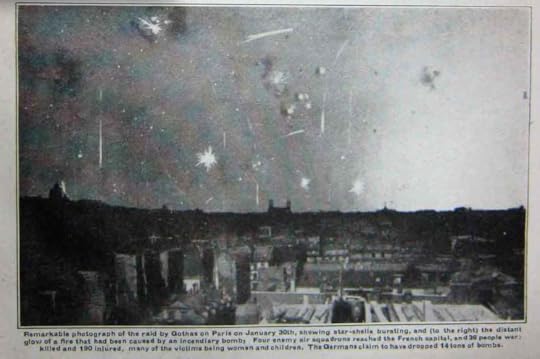
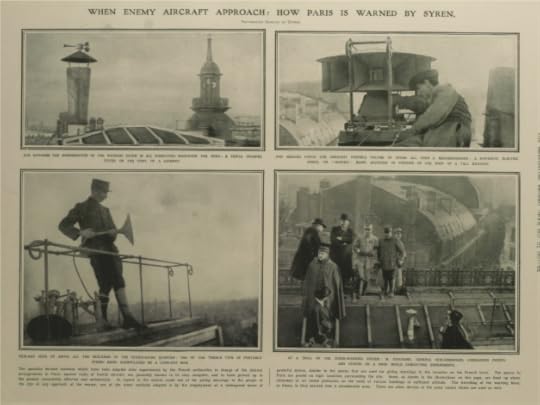


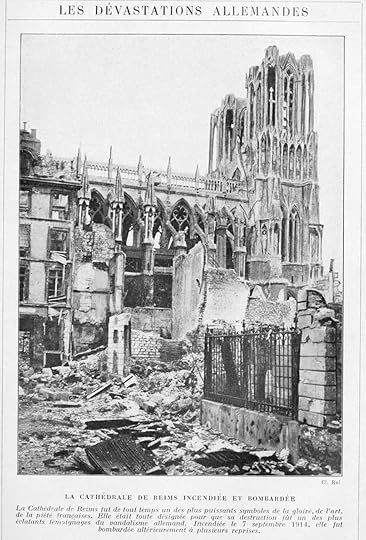
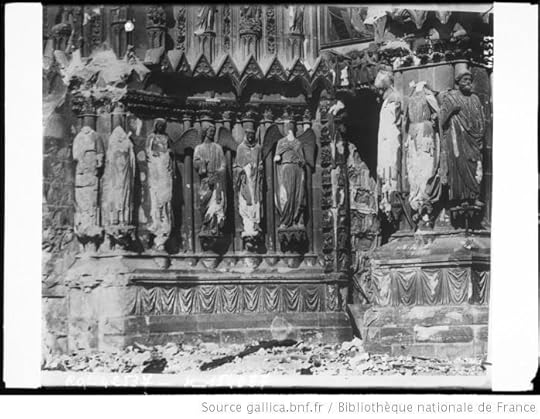


Brichot's cover for his personal opinions, so cleverly lampooned here by the Narrator: À partir de ce moment Brichot remplaça 'je' par 'on', mais 'on' n'empêchait pas le lecteur de voir que l'auteur parlait de lui et permit à l'auteur de ne plus cessait de parler de lui, de commenter la moindre de ses phrases, de faire un article sur une seule négation, toujours à l'abri de 'on'. P 177